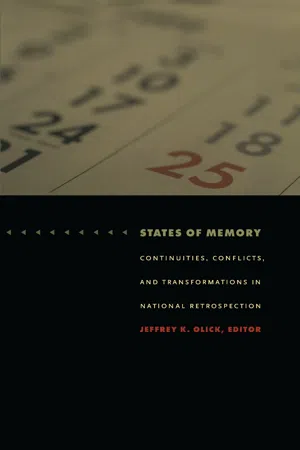
States of Memory
Continuities, Conflicts, and Transformations in National Retrospection
- English
- PDF
- Available on iOS & Android
States of Memory
Continuities, Conflicts, and Transformations in National Retrospection
About This Book
States of Memory illuminates the construction of national memory from a comparative perspective. The essays collected here emphasize that memory itself has a history: not only do particular meanings change, but the very faculty of memory—its place in social relations and the forms it takes—varies over time. Integrating theories of memory and nationalism with case studies, these essays stake a vital middle ground between particular and universal approaches to social memory studies.
The contributors—including historians and social scientists—describe societies' struggles to produce and then use ideas of what a "normal" past should look like. They examine claims about the genuineness of revolution (in fascist Italy and communist Russia), of inclusiveness (in the United States and Australia), of innocence (in Germany), and of inevitability (in Israel). Essayists explore the reputation of Confucius among Maoist leaders during China's Cultural Revolution; commemorations of Martin Luther King Jr. in the United States Congress; the "end" of the postwar era in Japan; and how national calendars—in signifying what to remember, celebrate, and mourn—structure national identification. Above all, these essays reveal that memory is never unitary, no matter how hard various powers strive to make it so.
States of Memory will appeal to those scholars-in sociology, history, political science, cultural studies, anthropology, and art history-who are interested in collective memory, commemoration, nationalism, and state formation.
Contributors. Paloma Aguilar, Frederick C. Corney, Carol Gluck, Matt K. Matsuda, Jeffrey K. Olick, Francesca Polletta, Uri Ram, Barry Schwartz, Lyn Spillman, Charles Tilly, Simonetta Falasca Zamponi, Eviatar Zerubavel, Tong Zhang
Frequently asked questions
Information
Table of contents
- Contents
- Acknowledgments
- Jeffrey K. Olick, Introduction
- Frederick C. Corney, Rethinking a Great Event: The October Revolution as Memory Project
- Simonetta Falasca Zamponi, Of Storytellers and Master Narratives: Modernity, Memory, and History in Fascist Italy
- Matt K. Matsuda, Idols of the Emperor
- Tong Zhang and Barry Schwartz, Confucius and the Cultural Revolution: A Study in Collective Memory
- Paloma Aguilar, Institutional Legacies and Collective Memories: The Case of the Spanish Transition to Democracy
- Lyn Spillman, When Do Collective Memories Last?: Founding Moments in the United States and Australia
- Francesca Polletta, Legacies and Liabilities of an Insurgent Past: Remembering Martin Luther King Jr. on the House and Senate Floor
- Uri Ram, Postnationalist Pasts: The Case of Israel
- Jeffrey K. Olick, What Does It Mean to Normalize the Past?: Offcial Memory in German Politics since 1989
- Carol Gluck, The "End" of the Postwar: Japan at the Turn of the Millennium
- Eviatar Zerubavel, Calendars and History: A Comparative Study of the Social Organization of National Memory
- Charles Tilly, Afterword: Borges and Brass
- Contributors
- Index